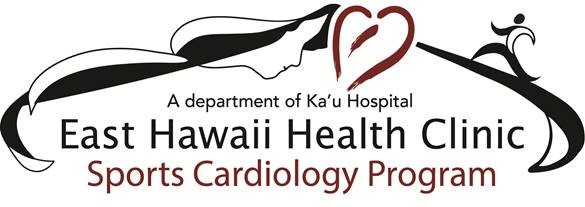
Sports Cardiology Program
Our Mission
The East Hawaii Sports Cardiology program is the only program in the state dedicated to the care of the athlete’s heart. We offer screening, evaluation, and treatment to high school, college, professional, masters, tactical, and recreational athletes at all levels of ability and stages of life. We work with every athlete individually to understand their unique goals and needs and provide targeted evaluation and treatment recommendations to enhance performance and safety.
All patients receive a detailed medical and athletic history, physical examination, and ECG. Further testing and treatment is tailored to the specific needs of each athlete. Advanced diagnostic techniques such as echocardiography (including 3D imaging), stress testing, coronary angiography, cardiac MRI or CT, extended rhythm monitoring, and genetic testing are available as necessary.
Sports Cardiology
Who should see a Sports Cardiologist
Anyone with the following:
- • Symptoms of cardiovascular disease
- ○ chest pain
- ○ shortness of breath
- ○ changes in exercise capacity
- ○ heart palpitations
- ○ syncope (passing out)
- • Personal history of cardiovascular disease
- ○ Coronary Artery Disease
- ○ Cardiomyopathy (Weak Heart Muscle)
- ○ Valvular Heart Disease
- ○ Arrhythmias
- ○ Hypertension
- ○ Aortopathy
- ○ History of implantable cardiac device
- • A family history of cardiovascular disease
- • Anyone seeking reassurance and estimation of their risk for sudden cardiac death
- • Anyone seeking interpretation or second opinion of recent cardiovascular testing (ECG, echocardiogram, etc.)
- • Return to play assessment following COVID-19 infection
Sports Cardiology
What We Treat
We offer screening, evaluation, and treatment of athletes at all levels of ability and stages of life:
- • Chest pain experienced during or after physical activity
- • Evaluation for sports participation clearance
- • Sudden death prevention
- • Unexplained decline in athletic performance
- • Risk factors or a family history of cardiovascular disease or sudden cardiac death
- • Athlete’s heart
- • Cardiomyopathies
- • Syncope (passing out) or near syncope experienced during or after physical activity
- • Palpitations / cardiac arrhythmias
- • ECG/EKG abnormalities
- • Coronary artery disease
- • Sudden cardiac death prevention
- • Return to training and competition following COVID-19 infection
- • Return to training and competition following a cardiovascular event or procedure
Sports Cardiology
Clinical Assessment
All patients receive a comprehensive medical and athletic history, physical examination, ECG, and consultation. Further testing may include:
Exercise Stress Test
A cardiac exercise stress test measures the hearts’ ability to respond to physical stress in a controlled environment. It is used to assess the overall condition of your cardiovascular system as well as help diagnose major blockages in heart arteries or rhythm abnormalities brought on by exercise. We use a variety of exercise modalities allowing us to tailor the test to each individual athlete and their sport, providing the most accurate assessment possible. Depending on your sport, we may combine modalities or involve others such as box jumps or swim trainers.
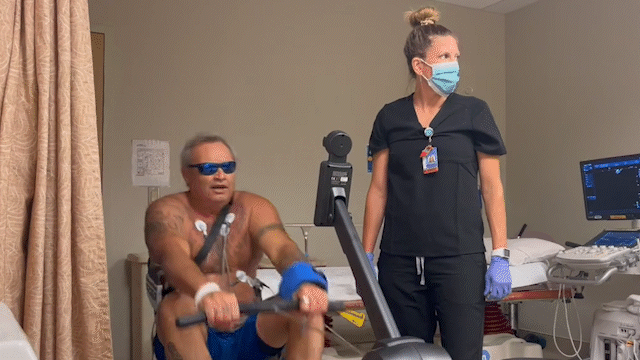
ECG
An ECG is a painless test that measures the electrical activity of the heart. It takes about 2-3 minutes to complete and requires no physical activity.
ECHOCARDIOGRAM
An echocardiogram is a painless test that uses ultrasound or sound waves to image the heart muscle. This test will focus specifically on identifying structural abnormalities of the heart.
Myocardial Perfusion Study (stress test)
A myocardial perfusion study is an imaging test which evaluates blood flow through the arteries of the heart. It is a noninvasive way to look for blockages in the heart artery.
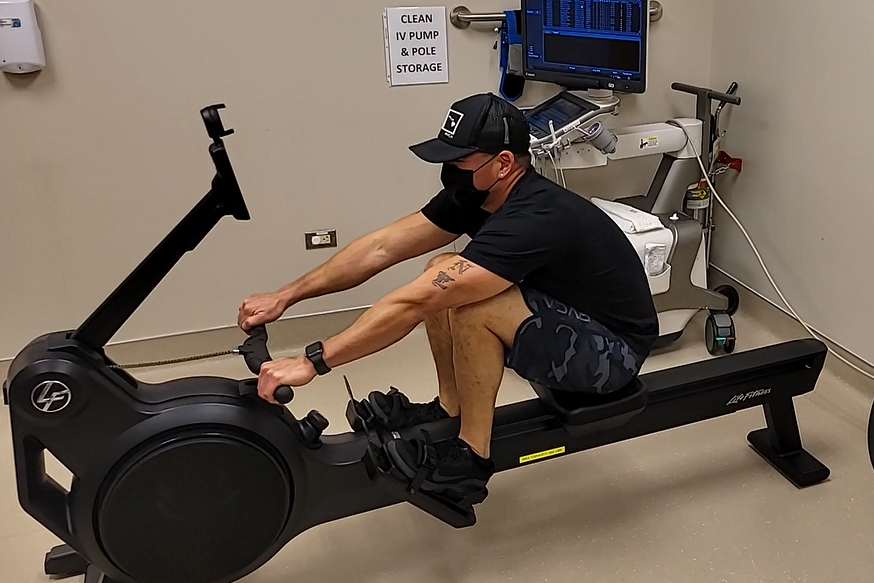
Cardiac CTA
Cardiac CTA is a specialized CAT used specifically to image the heart arteries as a way to evaluate for blockages or other abnormalities in their structure or course.
Cardiac MRI
Cardiac MRI is a type of imaging test that provides very detailed images of the heart and surrounding soft tissue. It is used to evaluate for a variety of conditions including, heart function, damage and inflammation to the heart muscle or membrane surrounding the heart, heart valve defects, and congenital heart defects.
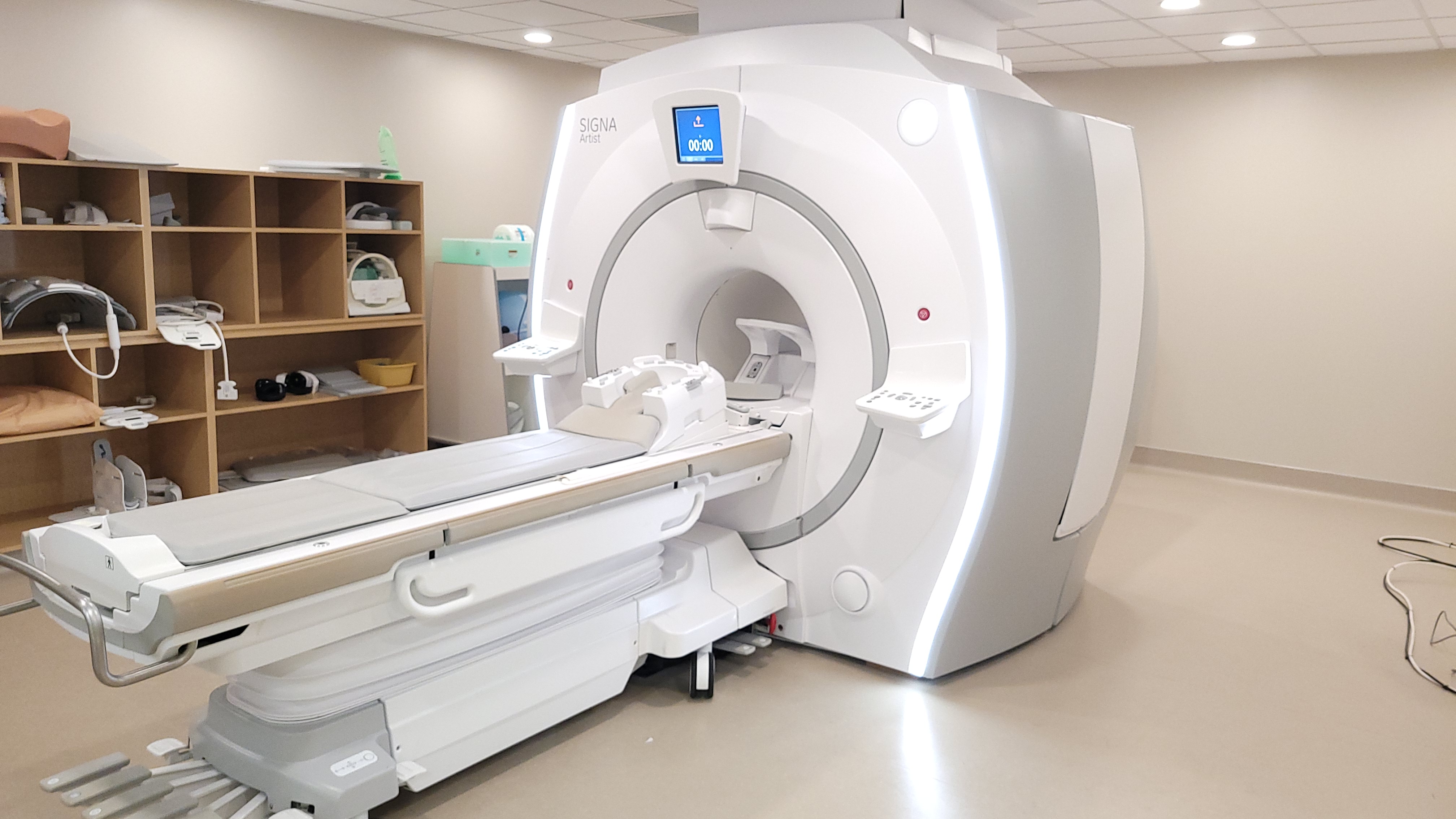
Ambulatory rhythm monitoring
Ambulatory rhythm monitors are devices that record the electrical activity of the heart. These small devices are worn for an extended period of time and are useful for diagnosing heart rhythm problems that occur infrequently and unpredictably.
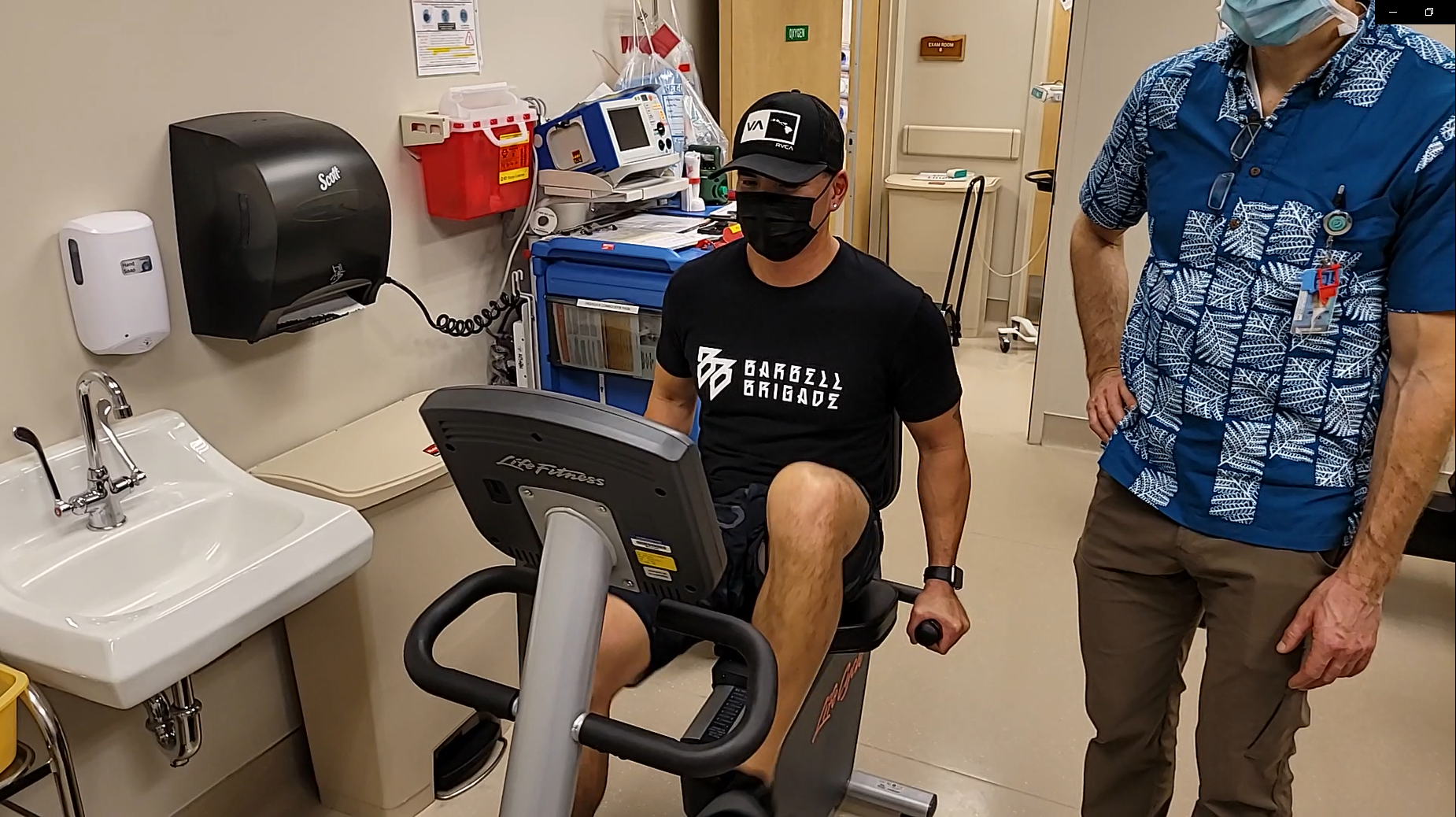
Genetic testing
Sports cardiology practice commonly involves evaluating athletes to distinguish normal ‘athletes heart’ from pathology. In selected individuals, genetic testing may aid in this evaluation. For athletes with known conditions, genetic testing can often be used as a method of investigating other family members for the presence or absence of the disease.
East Hawaii Health Clinics
Our Team
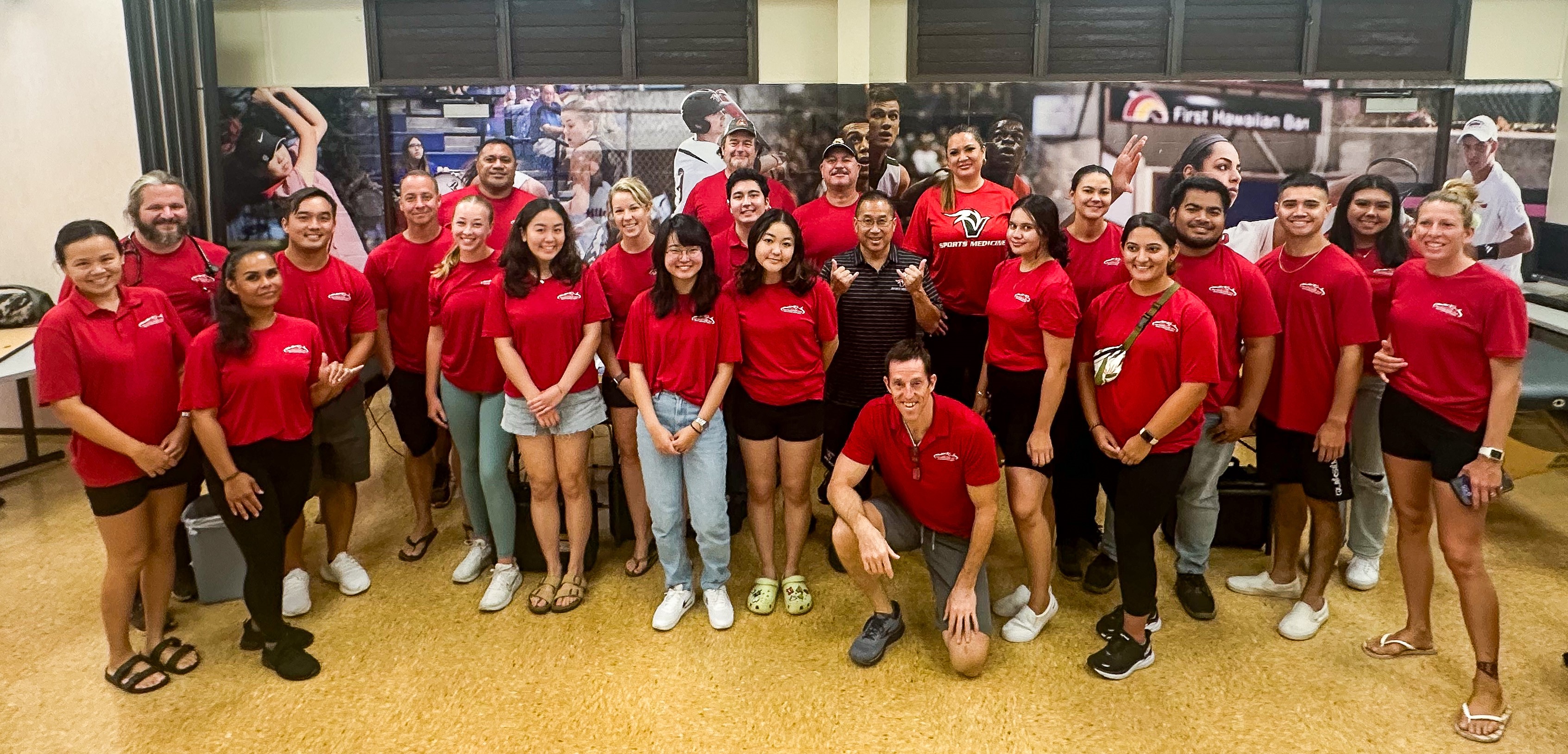
We also partner with surgeons, electrophysiologists, and other specialists in Oahu when services not provided on the island are necessary.
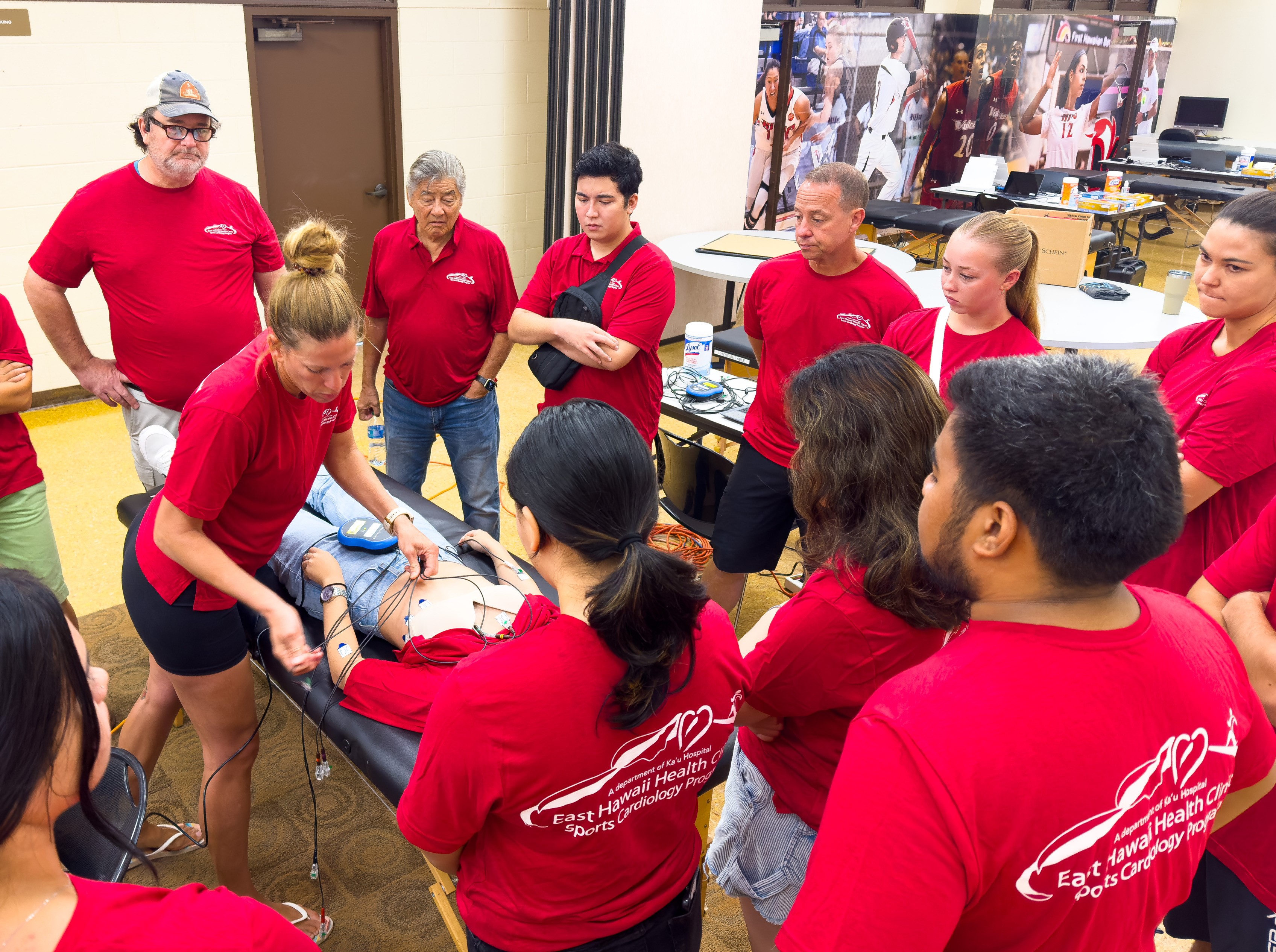
Sports Cardiology
Youth ECG screening
Sudden cardiac death of a young adult is a devastating occurrence. Over 100 young adults per week suffer sudden cardiac arrest in the United. The majority of conditions predisposing to sudden cardiac arrest are “clinically silent” and may be missed by a standard examination while an ECG will identify about 90% of the electrical and structural abnormalities that place a young person at risk for sudden cardiac arrest. Our mission is to raise awareness of this condition and work to prevent sudden cardiac arrest in young people in our community by offering free heart screenings to all students age 14-24 on Hawaii Island.
It is estimated that sudden cardiac death occurs in a young, apparently healthy person about once every three days somewhere in the United States. This is obviously a devastating occurrence. The best test we have for identifying the conditions which place a young person at risk for cardiac arrest is an ECG. This is a painless test, taking less than 5 minutes to complete, which records the electrical activity of the heart. The ECG will identify roughly 90% of the conditions which put someone at risk for cardiac arrest. Unfortunately, history and physical examination alone will only identify about 15% of those same conditions.
This is why we feel very strongly about offering ECG screening to all young people on the island, not just athletes, between the ages of 14-24. This screening should be completed a minimum of every 2 years until the age of 24. Please check our website for an upcoming event in your area or contact us today to arrange a screening for your school or group.
Sports Cardiology
Frequently Asked Questions
WHAT IS AN ECG?
An ECG is a painless test that measures the electrical activity of the heart. It takes about 2-3 minutes to complete and requires no physical activity.
WHAT IS THE COST?
This is a free screening being offered in conjunction with the Hawaii Island Family Health Clinic and the Sports Cardiology department at Hilo Medical Center.
WHAT TO EXPECT THE DAY OF SCREENING?
Please have your prescreening form filled out prior to your screening. Wear comfortable, loose fitting clothing. Boys and girls will be screened in separate areas. Everyone will receive an ECG and focused physical examination.
Your ECG will be interpreted by a cardiologist onsite and you may also undergo an echocardiogram depending on your individual findings.
If no abnormalities are detected, the entire process should take under 30 minutes.
WHAT IF MY SCREENING IS ABNORMAL?
Anyone with an identified abnormality on their initial screening will undergo a limited echocardiogram for further evaluation the day of the screening. These results will be sent to your PCP. An abnormal screening does not necessarily mean you have a serious condition or will be disqualified from sports. Based upon your specific findings, your PCP my send you for further testing and / or evaluation with a cardiologist.
Approximately 2-3% of screening ECG’s will be “false positive” meaning the ECG is abnormal but further testing confirms no abnormality is actually present. We recognize this may produce some anxiety while testing is ongoing. We believe the benefit of this potentially life-saving screening outweighs this concern.
WHAT IS AN ECHOCARDIOGRAM?
An echocardiogram is indicated only for those with an abnormal ECG or history/physical. It is a painless test that uses ultrasound or sound waves to image the heart muscle. This test will focus specifically on identifying structural abnormalities of the heart.
WHAT HAPPENS TO MY RESULTS?
You will be provided with a copy of your ECG before leaving the testing area. The results will not be shared with your school.
IF MY ECG IS NORMAL DOES IT NEED TO BE REPEATED IN THE FUTURE?
Current recommendations are to repeat an ECG every 2 years up to age 25 while participating in sports. An ECG may be performed sooner if new symptoms arise.
ECG Screening Forms
Sports Cardiology
Community Programs
Highlights From Our Events






Upcoming Events
Community Outreach
If you belong to an institution or organization seeking help with medical planning, AED / CPR training, our team can assist you.
Our support services are useful for:
- • Universities and colleges
- • Youth or adult league sports
- • Large employers or other institutions
- • Community race organizations
Sports Cardiology
Educational Resources
News and Information from Our Team
Sports Cardiology
Contact Us
| Physical Address: 1190 Waianuenue Avenue, First Floor, Hilo, Hawaii 96720 |
Phone: 📞 (808) 932-3730 Fax: 📠 (808) 974-6798 |
Email: EHHSportsCardiology@hhsc.org Hours: M-F 8:00 AM - 4:30 PM PM *except Federal and Hawai’i state holidays |







